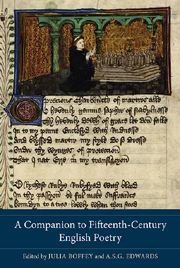Book contents
- Frontmatter
- Contents
- List of Contributors
- List of Abbreviations
- Conventions
- Introduction
- Part I Background and Context
- Part II Authors
- Part III Themes and Genres
- 11 Fifteenth-Century Chaucerian Visions
- 12 Historical and Political Verse
- 13 Classical and Humanist Translations
- 14 Romance
- 15 Scientific and Encyclopaedic Verse
- 16 Popular Verse Tales
- 17 Beyond the Fifteenth Century
- Chronology
- Index of Manuscripts
- General Index
17 - Beyond the Fifteenth Century
from Part III - Themes and Genres
Published online by Cambridge University Press: 05 July 2013
- Frontmatter
- Contents
- List of Contributors
- List of Abbreviations
- Conventions
- Introduction
- Part I Background and Context
- Part II Authors
- Part III Themes and Genres
- 11 Fifteenth-Century Chaucerian Visions
- 12 Historical and Political Verse
- 13 Classical and Humanist Translations
- 14 Romance
- 15 Scientific and Encyclopaedic Verse
- 16 Popular Verse Tales
- 17 Beyond the Fifteenth Century
- Chronology
- Index of Manuscripts
- General Index
Summary
The Great Chronicle of London, written in the fifteenth and early sixteenth centuries, contains a number of poems in addition to its main prose narrative. One of these was composed as an attack on John Grimaldi, a crony of Henry VII's much loathed ministers, Richard Empson and Edmund Dudley, both executed in 1510. The poem includes the following passage:
O most cursid Caytyff, what shuld I of the wryte
Or telle the particulers, of thy cursid lyffe
I trow if Skelton, or Cornysh wold endyte
Or mastyr moor, they myght not Inglysh Ryffe
Nor yit Chawcers, if he were now in lyffe
Cowde not in metyr, half thy shame spelle.
(Edwards, ed., 1981: 46–7)These lines offer a version of the medieval inexpressibility topos: not even the several poets named here, ‘Skelton’, ‘Cornysh’, ‘mastyr moor’ and ‘Chawcer’ could adequately express in their verse the revulsion felt at Grimaldi's rapacity.
The conjunction of those names is worth some consideration. Geoffrey Chaucer still provides a touchstone of poetic excellence more than a century after his death. But the Great Chronicle also invokes a different range of reference, one that does not look to the past, but to the work of contemporary poets: John Skelton (c.1460–1529), William Cornish (d.1525) and Thomas More (1478–1535) were all at the beginning of their literary careers when this passage was composed. It is, in this respect, one without precedent.
- Type
- Chapter
- Information
- A Companion to Fifteenth-Century English Poetry , pp. 225 - 236Publisher: Boydell & BrewerPrint publication year: 2013

